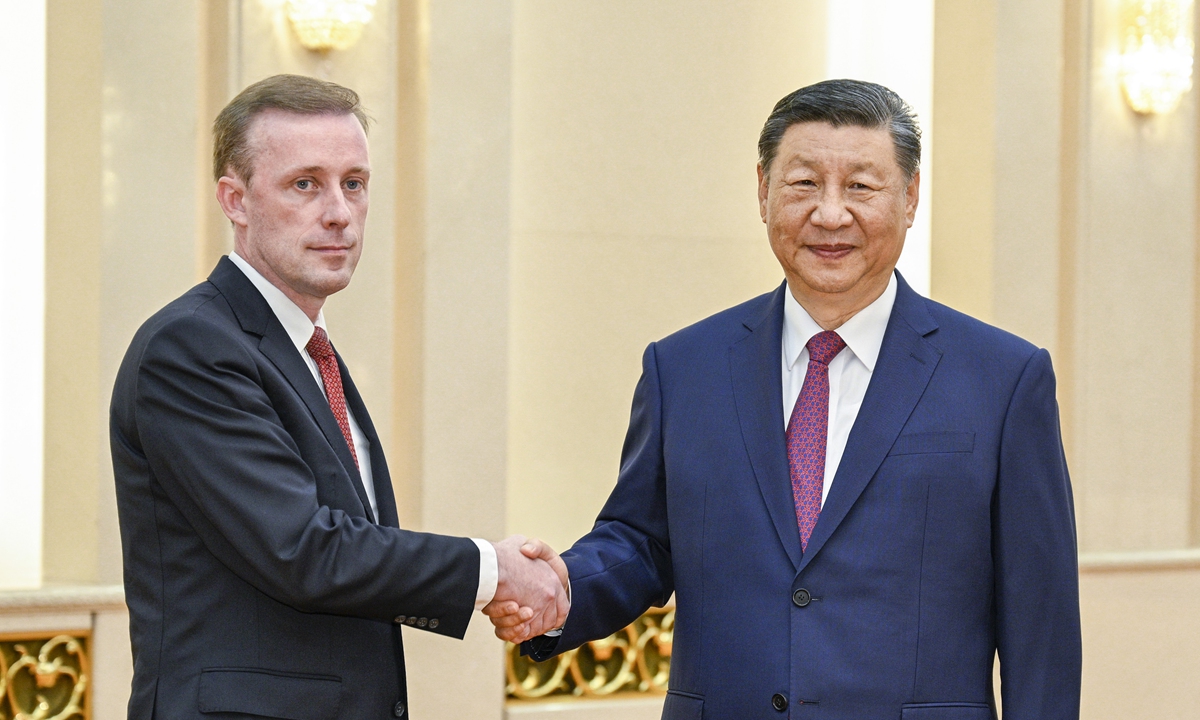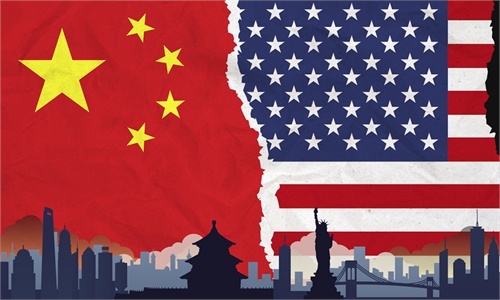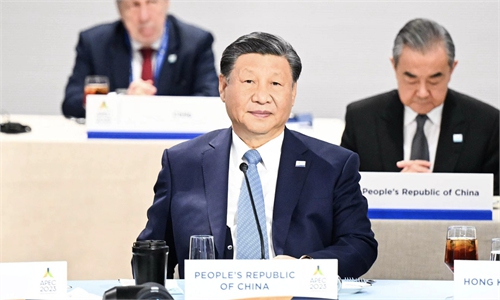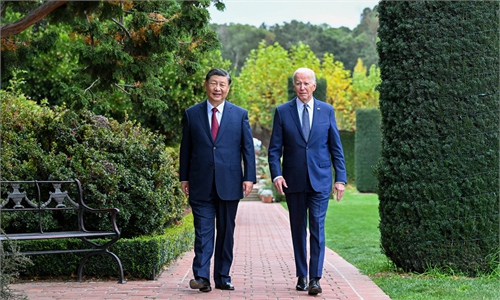US should view China’s devt in a rational light, Xi tells Sullivan
‘China’s commitment to stable, healthy, sustainable ties unchanged’

Chinese President Xi Jinping meets with US National Security Advisor Jake Sullivan at the Great Hall of the People in Beijing, China on August 29, 2024. Photo: Xinhua
China and the US, the two biggest economies in the world, have held their latest round of strategic communication, and will have more engagements in the field of commerce and climate soon. Experts said that both sides share the common ground of preventing the existing tensions from getting out of control and are seeking to add some pragmatic elements to China-US relations.
President Xi Jinping met with visiting US National Security Advisor Jake Sullivan in Beijing on Thursday.
Xi pointed out at the meeting that in this changing and turbulent world, countries need solidarity and coordination, not division or confrontation. People want openness and progress, not exclusion or regress. As two major countries, China and the US should be responsible for history, for the people and for the world, and should be a source of stability for world peace and a propeller for common development.
While great changes have taken place in the two countries and in China-US relations, China’s commitment to the goal of a stable, healthy and sustainable China-US relationship remains unchanged, the principle of handling the relationship based on mutual respect, peaceful coexistence and win-win cooperation remains unchanged, its position of firmly safeguarding the country’s sovereignty, security and development interests remains unchanged, and its efforts to carry forward the traditional friendship between the Chinese and American people remain unchanged, Xi said.
Xi expressed the hope that the US side will work with China in the same direction, view China and its development in a positive and rational light, see each other’s development as an opportunity rather than a challenge, and work with China to find a right way for two major countries to get along.
What both sides need
During his three-day visit to China, Sullivan also met with China’s top diplomat Wang Yi and Zhang Youxia, vice chairman of the Central Military Commission.
Chinese analysts said that the arrangement shows that Sullivan’s wish to have communications with high-ranking Chinese officials in both diplomatic and military sectors as well as the top leader had been met, and shows China’s sincerity in managing and stabilizing bilateral ties.
After Sullivan concluded his visit, commerce and trade teams from both sides will meet in China next week.
The second vice-ministerial meeting of the China-US commercial and trade working group will be held on September 7 in North China’s Tianjin Municipality, the Ministry of Commerce (MOC) announced Thursday. China International Trade Representative and Vice Minister of Commerce Wang Shouwen will co-chair the meeting with the US Under Secretary of Commerce for International Trade Marisa Lago, MOC spokesperson He Yadong said.
Bloomberg also reported on Wednesday that John Podesta, the US senior adviser to the president for international climate policy, is set to meet with China’s special envoy for climate change Liu Zhenmin in the first week of September.
Jin Canrong, associate dean of the School of International Studies at the Renmin University of China, told the Global Times on Thursday that it’s necessary to maintain communication in all channels to prevent any miscalculations in the remaining time of the Biden administration.
Another reason is that some major international events will take place in the second half of this year, such as the G20 Summit and the APEC meeting, where the two countries’ heads of state are likely to attend, Jin noted.
According to Xinhua on Wednesday, Wang and Sullivan discussed a new round of interaction between the two countries’ heads of state in the near future.
Six sessions, more than 11 hours
On Thursday night, Director-General of the Department of North America and Oceania Affairs of the Foreign Ministry Yang Tao gave a briefing to the media on Sullivan’s visit. He revealed that Wang Yi held strategic communication with Sullivan on Tuesday and Wednesday and the two sides had six sessions, totaling more than 11 hours, and discussed the China-US relations, sensitive issues and major international and regional hotspots.
Taiwan, democracy and human rights, path and system, and right to development are the four red lines China has drawn in China-US relations. The Chinese side raised serious concerns, articulated its position and laid out serious demands on these issues.
Xin Qiang, a scholar and expert on US studies at Fudan University, told the Global Times on Thursday that “people-to-people exchanges, including visa and flight issues, may see improvement” after a series of communications between the two countries.
However, Chinese experts are also being cautious about to what extent the communication can help ease the existing tensions.
Li Haidong, a professor from the China Foreign Affairs University, told the Global Times on Thursday that “the China-US frictions or tensions on Taiwan question, South China Sea, trade war or sci-tech restrictions are unlikely to see much improvement as long as the US’ China containment strategy remains in place. The most we can do is to make sure the existing tensions don’t escalate and go out of control.”
Jin echoed that view, saying, “at this moment, we can at least add some pragmatic elements to the foundation of China-US relations, giving the next US government a relatively positive foundation to start its China policy with.”




